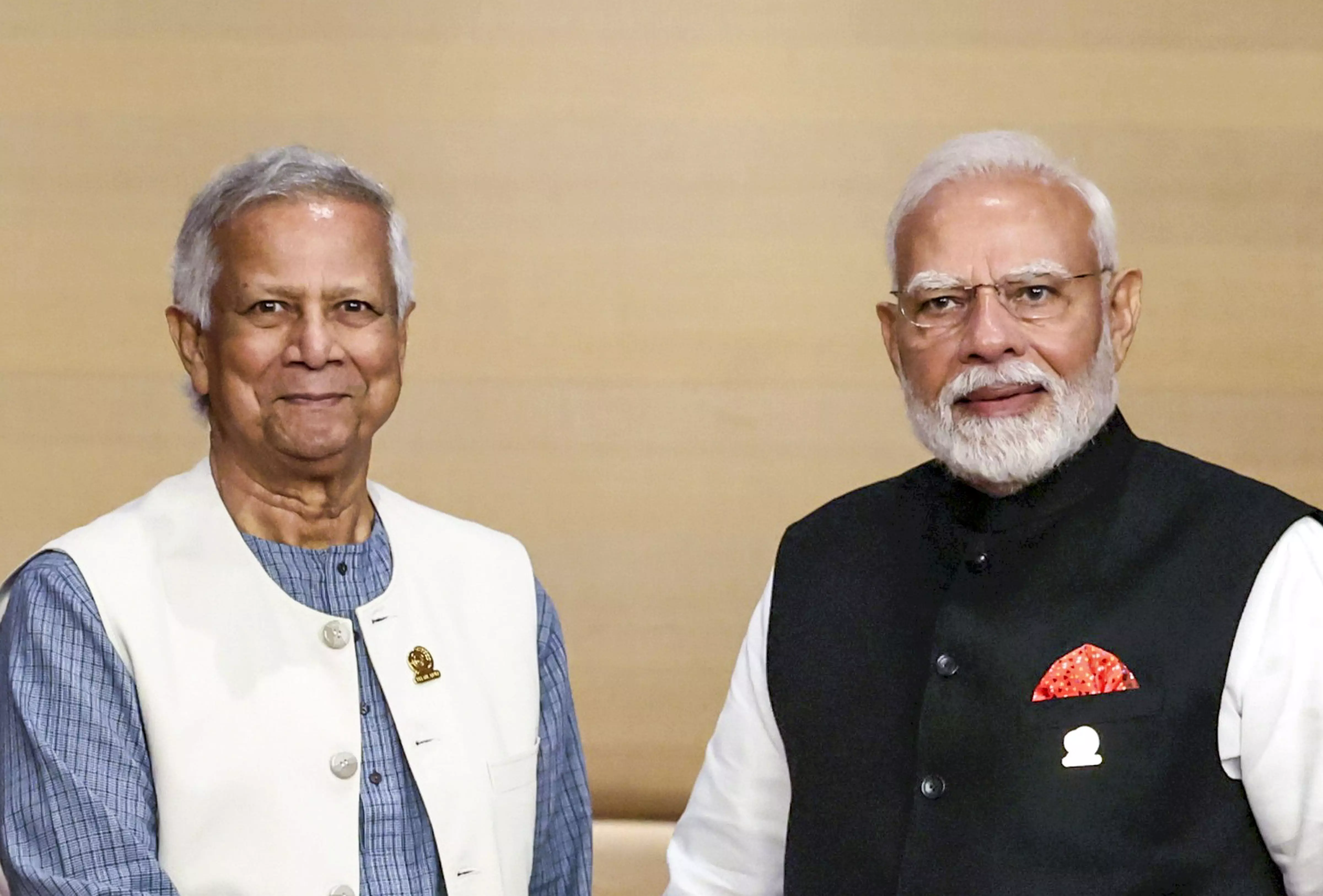Modi tells Yunus to avoid rhetoric
It may be recalled India had in January this year summoned the Bangladesh deputy high commissioner, Narul Islam, in apparent retaliation after Dhaka had earlier summoned India’s high commissioner Pranay Verma over a dispute arising from fencing activities on the border.

New Delhi: Amid a sharp deterioration in bilateral ties between New Delhi and Dhaka over the past eight months following the ouster of then Prime Minister Sheikh Hasina in August last year, Prime Minister Narendra Modi on Friday met Bangladesh interim government chief adviser (equivalent to PM) Muhammad Yunus on the sidelines of the Bimstec summit in Bangkok and told him clearly that “any rhetoric (affecting bilateral ties) that vitiates the environment is best avoided”. Mr Modi also raised “upfront” India’s strong concerns on the attacks on minorities including Hindus in Bangladesh and conveyed India’s “expectation” that the culprits would be brought to book and that the interim government would fulfil its responsibility in this regard.
However, batting for a “people-centric approach”, the Prime Minister also told Mr Yunus that India was ready for a positive and constructive relationship with Bangladesh based on pragmatism and added all issues between the two nations can be resolved bilaterally through constructive discussions. Bangladesh’s request last year to India to extradite Sheikh Hasina was also discussed at the meeting although New Delhi declined to give any more details, saying it would not be appropriate. The border issue was also discussed, with Mr Modi advocating “strict enforcement” of the law and “prevention of illegal border crossings especially at night” to maintain peace. The meeting between the two leaders was requested last week by the Bangladesh side and this was the first meeting between the two leaders ever since Mr Yunus assumed office last August.
At a special briefing in Bangkok, India’s foreign secretary Vikram Misri said Mr Modi had expressed India’s support for a “democratic, peaceful, stable, progressive and inclusive” Bangladesh, in what is seen as a clear message to the interim government in Dhaka to protect minorities and respect human rights and also to hold polls. In response to a question, Mr Misri also said “regular and inclusive elections” are a part of democracy that everyone is aware of, a veiled reference perhaps to the need to hold polls and also concern over demands in Bangladesh among student leaders to ban Sheikh Hasina’s Awami League party from contesting the polls.
Mr Modi’s reference to the need to avoid harmful rhetoric that vitiates ties is also being seen by observers as a reference to the shrill and open anti-India rhetoric by members of Mr Yunus’ government and student leaders allied to his government in the past eight months. In a shocker last week during his visit to China, Mr Yunus himself had claimed that Bangladesh was the “sole guardian” of the ocean in its region on the grounds that the seven states in India’s Northeast are landlocked and had invited China for an “extension” of its economy in the region through building and marketing products. Mr Modi meanwhile congratulated Bangladesh on assuming the chair of Bimstec.
In a statement, New Delhi said: “Enunciating India’s people-centric approach to the relationship, the Prime Minister highlighted that cooperation between the two countries has brought tangible benefits to the people of both countries… The Prime Minister urged that rhetoric that vitiates the environment is best avoided. On the border, strict enforcement of the law and prevention of illegal border crossings, especially at night, are necessary for maintaining border security and stability. A bilateral mechanism could meet as appropriate to review and take forward our ties. The Prime Minister underlined India’s concerns related to the safety and security of minorities in Bangladesh, including Hindus, and expressed his expectation that the Government of Bangladesh would ensure their security, including by thoroughly investigating the cases of atrocities committed against them… The PM expressed his conviction that all issues of mutual interest between the two countries would continue to be addressed and resolved bilaterally through constructive discussions, in the interest of their long-standing and mutually beneficial bilateral relationship.”
It may be recalled India had in January this year summoned the Bangladesh deputy high commissioner, Narul Islam, in apparent retaliation after Dhaka had earlier summoned India’s high commissioner Pranay Verma over a dispute arising from fencing activities on the border.

